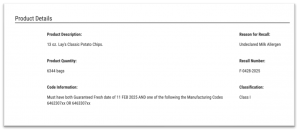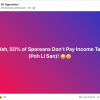We’ve come across many TikTok videos and X posts about Lay’s potato chips being recalled. Some videos purport to show severe allergic reactions taking place, while other videos and comments speculate about whether Lay’s products are safe to consume – with text such as “your life could be in danger.”

Many posts across social media mention that the recalled chips, “could cause death,” or that the United States Food and Drug Administration (FDA) has classified them as being at the “highest risk level.” While some claims seem to suggest that this issue is widespread or possibly even international, others seem only be referencing the United States. We took a closer look to find out the facts. According to news reports and statements from Lay’s and the FDA, the company did issue a recall in December due to the presence of “undeclared milk” in 13oz. bags of Lay’s Classic Potato Chips. As the presence of milk was not disclosed on the bags, this could have led to allergic individuals unwittingly consuming them, potentially causing serious or life-threatening reactions in those with severe sensitivities.
According to news reports and statements from Lay’s and the FDA, the company did issue a recall in December due to the presence of “undeclared milk” in 13oz. bags of Lay’s Classic Potato Chips. As the presence of milk was not disclosed on the bags, this could have led to allergic individuals unwittingly consuming them, potentially causing serious or life-threatening reactions in those with severe sensitivities.
Because of these risks, the FDA in turn classified the recall as “Class 1” – which means that there is “reasonable probability that the use of or exposure to a violative product will cause serious adverse health consequences or death.” However, as is clearly stated in most of the official statements, this recall and “undeclared milk” issue was only present in bags distributed across two American states – Washington and Oregon. In a statement provided to Verify, the FDA further clarified that the “recalled product has been removed from the marketplace.”
However, as is clearly stated in most of the official statements, this recall and “undeclared milk” issue was only present in bags distributed across two American states – Washington and Oregon. In a statement provided to Verify, the FDA further clarified that the “recalled product has been removed from the marketplace.”
Therefore, the recalled chips are unsafe to individuals with milk allergies and the recall has been labelled as high risk because of the potential serious impacts to those individuals. However, while the above facts are true, the claims being made on social media often omit or do not specify details such as milk being the undeclared safety risk. Many also imply that the chips pose a general safety risk, or that all Lay’s chips are being recalled (either across the United States or worldwide) rather than just a specific batch in two American states.
When looking closer at some of the claim videos, we also noted that clips of severe allergic reactions were used – with some videos directly stating that Lay’s chips were the cause. However, according to all official sources, there have been no reported cases of allergic reactions from the specific recalled batch of chips. Instead, we found that unrelated videos of allergic reactions – for instance clips of a woman with severe swelling around her eyes – were clipped and misrepresented. The original creator of those videos posts about her “40+ allergies,” and the specific clips of her swollen eyes are actually from a life-threatening allergic reaction she documented in a video posted over a year ago. According to the video, the exact cause of her reaction is unknown, but is more likely the result of an external allergen rather than something she ate.”
Instead, we found that unrelated videos of allergic reactions – for instance clips of a woman with severe swelling around her eyes – were clipped and misrepresented. The original creator of those videos posts about her “40+ allergies,” and the specific clips of her swollen eyes are actually from a life-threatening allergic reaction she documented in a video posted over a year ago. According to the video, the exact cause of her reaction is unknown, but is more likely the result of an external allergen rather than something she ate.”

Therefore, while this claim has elements of truth, the viral posts we have seen are a combination of sensationalist headlines and omissions of full context that, rather of conveying information, actually spread misinformation instead.
We give the claim that Lay’s potato chips are unsafe and could cause death a rating of partially true – a specific batch with undisclosed milk could be fatally unsafe to some, but a large proportion of those chips have already been recalled. There is no evidence to support claims that they have actually trigger severe allergic reactions, nor that this an issue outside of two specific states in America.

Food-based claims frequently go viral – and can cause widespread anxiety, especially when a popular brand or food-type is involved. The rapid spread of this claim crossed borders despite it only being situated in the United States, with social media users from all over the world (including Singapore) questioning the safety of Lay’s chips.
In cases such as this, it is important to seek out original sources and statements to glean the full context to prevent misinformation and unnecessary stress.



